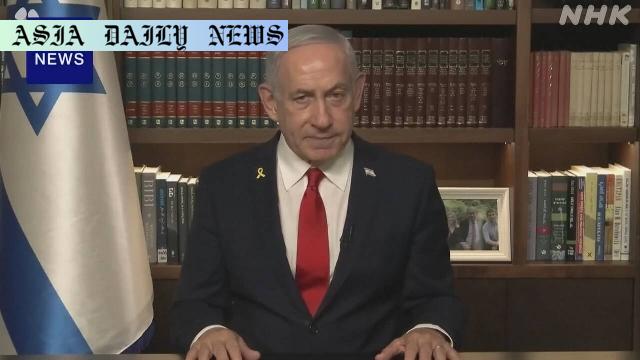Netanyahu renews commitment to Gaza operations after horrifying hostage videos surface.

Netanyahu’s Renewed Commitment to Resolving the Gaza Crisis
Israeli Prime Minister Benjamin Netanyahu has reaffirmed his steadfast determination to continue Israel’s military operations in Gaza, citing the recent release of hostage videos by Hamas as a driving factor. In a video message released on Sunday, Netanyahu addressed the mounting humanitarian challenges and the deeply unsettling reality showcased in the videos featuring two Israeli captives.
The hostage videos, released by Hamas, depicted two significantly undernourished individuals, with one caption pointedly stating, “The occupation government has decided to starve them.” The graphic nature of the footage underscored the dire living conditions within Gaza and amplified calls for immediate humanitarian intervention. These videos have been interpreted as an effort by Hamas to leverage the crisis to coerce Israel into increasing the delivery of food and aid within the Palestinian territories.
The Humanitarian Toll in Gaza: A Growing Crisis
Netanyahu’s response to these videos highlighted a broader humanitarian angle. While acknowledging the harrowing nature of the hostage situation, he expressed grave concerns about the dire living conditions for the captives and the broader civilian population in Gaza. Acute food shortages have reportedly contributed to widespread malnutrition and starvation among Gaza’s residents, intensifying international pressure on both Israel and Hamas to prioritize humanitarian efforts.
In a pointed appeal, Netanyahu urged the International Committee of the Red Cross to take swift action to ensure food and medical supplies reach the hostages. Such efforts, he emphasized, must align with ensuring safety and security amidst ongoing military activities. However, Hamas has placed conditions on its cooperation, insisting that humanitarian corridors must be opened for aid distribution across Gaza, with guarantees of an airstrike halt during these periods.
Prospects of a Resolution Amid Escalating Violence
The ongoing conflict between Israel and Hamas remains a deeply complex and fluid crisis, with international actors urging for de-escalation and a focus on humanitarian objectives. As Netanyahu strengthens his government’s resolve to counter Hamas, global attention pivots toward the need for sustainable resolutions grounded in mutual cooperation and adherence to international laws.
Hamas’ readiness to cooperate with organizations like the Red Cross is viewed as a potential opening for increased aid delivery. However, this opportunity hinges on Israel’s willingness to create and secure humanitarian corridors and temporarily halt its military campaigns during aid distribution. Until such agreements materialize, the plight of Gaza’s residents, as well as those held hostage, remains precarious.
A Global Call to Action: Addressing the Crisis
The international community’s role in this crisis cannot be overemphasized. Global powers, humanitarian organizations, and diplomatic entities must collaborate to mediate and address the escalating violence. Amid the ongoing military engagements, the humanitarian dimension requires urgent, practical measures—from securing safe passages for aid to ensuring the safety of civilians and hostages alike.
As Netanyahu’s administration intensifies its operations, the path to peace and the stabilization of Gaza will undoubtedly require intricate balancing acts and negotiations. In the face of harsh realities and emotional pleas from affected families, the imperative to act empathetically and swiftly grows ever more pressing.
Commentary
The Moral and Strategic Implications of Netanyahu’s Decisions
The latest developments in the Gaza conflict, marked by the release of hostage videos and Israel’s continued military resolve, shed light on the deeply entangled web of morality, strategy, and humanitarian concerns. While Prime Minister Netanyahu’s renewed determination to counter Hamas underscores the grim reality of the situation, it also raises pertinent questions about the broader implications of such actions, both for Israel and the international community.
Netanyahu’s insistence on continuing military operations reflects Israel’s long-standing posture of prioritizing national security and its fight against terrorism. However, the disturbing visuals of emaciated hostages and accounts of widespread starvation in Gaza compel the global audience to question whether the current approach adequately addresses both security objectives and humanitarian responsibilities. Leaders inevitably face such dilemmas in conflicts, yet the optic of perceived inaction on alleviating human suffering threatens to undermine broader diplomatic and public support for Israel.
The Role of Humanitarian Cooperation Amid Strategic Goals
On the other hand, Hamas’ decision to leverage the hostage situation for aid underscores the lengths to which factions involved in this conflict will go. While the group’s offers to cooperate with the Red Cross introduce a new dimension to negotiation potentials, their conditional demands also indicate that strategic maneuvering, rather than humanitarian concerns, remains at the core of their objectives.
Netanyahu’s government is thus faced with a monumental and multifaceted challenge. The call for temporary humanitarian corridors is not one to be taken lightly. Such a measure, if agreed upon, could pave long-term pathways for cooperation and de-escalation while simultaneously aiding thousands of civilians in urgent need. At the same time, Israel must walk the tightrope of maintaining a staunch position against threats to its sovereignty and security.
A Call for Global Intervention and Lasting Resolutions
The situation in Gaza is not merely a regional crisis; it is a litmus test for global humanity. The haunting images of hostages and the civilian toll reiterate the need for a united global front to mediate the crisis effectively and sustainably. Temporary solutions, though crucial, must be layered with long-term diplomatic efforts focused on addressing the root causes of violence and ensuring sustained peace in the region.
While Netanyahu’s resolve reflects the urgency of neutralizing threats, the collateral humanitarian cost demands equally urgent attention. The complex interplay between security, diplomacy, and empathy will define the strategies employed in the days to come, with the ultimate objective of fostering peace and restoring dignity to all affected parties.


